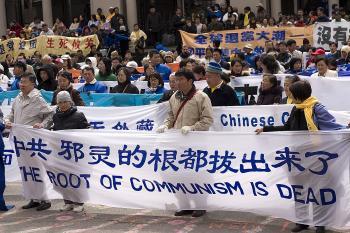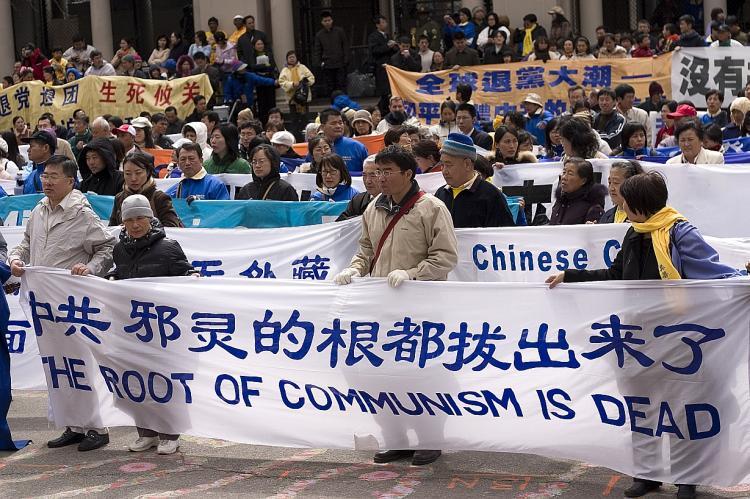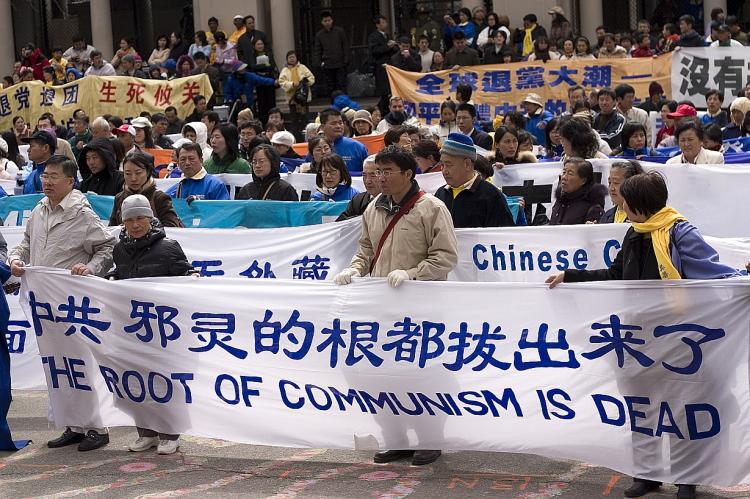Beneath the media censorship and Internet blockades of China, a movement is spreading like wildfire with the potential to put an end to the ruling communist regime.
The Tuidang or “Quit the Party” movement has seen a wave of Chinese withdrawing their memberships from the Chinese Communist Party (CCP) and its affiliated organizations. This month the number of withdrawals exceeded 50 million.
According to the president of the Global Quitting the CCP Service Center, Dr. David Gao, for many living under the strict control of the CCP, Tuidang is seen as the only hope for a peaceful future.
“The Communist Party did so many bad things that have hurt the hearts of every Chinese person,” said Mr. Gao in a phone interview from his current home in San Diego.
“Chinese people aren’t scared of the Communist Party anymore. They dare to speak out, dare to go to the street, and dare to put up slogans calling for the end of the Communist Party,” he said.
Amidst social unrest in China, Mr. Gao said that the Tuidang movement is among some of the only peaceful approaches the Chinese have in combating the authoritarian regime. He referred to its approach as a process of awakening. “When people make a decision to quit, it shows that they realize that the Communist Party is evil and that they don’t want to be a part of it.”
Protests have become a daily practice in China as unemployment, regime corruption, and the call for democracy spreads further.
Little news of this reaches even the Chinese people, let alone the outside world.
A Free China
Rong Yi, vice president of the Quitting the CCP Service Center, works from the center’s main office in Flushing, New York City. The volunteer group started the Tuidang movement in 2005 with a dream of freedom in China.
Ms. Yi said that the 50 million mark for withdrawals carries deep meaning for the Chinese people living in the United States, due to “the language barrier, even when they come to the United States they don’t have access to the free media. They don’t know what’s happening in the world. So their minds are still being controlled by the CCP media, including some overseas Chinese media,” she said.
Most of the volunteers at the Quitting the CCP Service Center are Chinese immigrants, some of whom have experienced the CCP’s persecution firsthand in various re-education and labor camps for their belief in Falun Gong, a Chinese meditation discipline based on truthfulness, compassion, and tolerance.
The center receives daily withdrawals from the CCP numbering in the thousands, and according to Ms. Yi, the number has been steadily increasing since the Tuidang movement began in 2005. The number has jumped from close to 30,000 per day to more than 50,000 per day. Withdrawal statements are received through mail, e-mail, fax, phone, and even in-person visits.
On Feb. 23 alone, the Center reported that 51,949 people withdrew.
The three groups people are withdrawing from are the Chinese Communist Party, the Communist Youth League, and the Young Pioneers.
“The Chinese people are so eager to get rid of the communist control. They long for a free China—to enjoy the freedom of speech and the freedom of belief like the rest of the world,” Ms. Yi said. “They know the evil nature of communism, and they want to get rid of the terror that controls them. They’re tired of the CCP authority. The Chinese people have suffered so much.”
“Big changes will happen within the next three years,” she said.
Among the former Party members is Chunlin Li, Ph.D candidate in literature currently living in San Diego. He moved to the United States from China’s Heilongjiang Province. He published his withdrawal from the CCP in 2005, following the publishing of “Nine Commentaries on the Communist Party,” an editorial series by The Epoch Times that exposes the history of the CCP.
“Ever since I came to the United States in 2001, I already realized what the CCP had done to the Chinese people during the past 50 or 60 years,” Mr. Li said in a phone interview. “I was able to access a lot of free information about the past of China—the Tiananmen Square Massacre, the persecution of Falun Gong, and the series of political campaigns launched by the CCP after 1949.”
Mr. Li now often speaks about the state of China at rallies and human rights events in San Diego. “It makes my conscience more peaceful if I actually do something,” he said, adding that few in the West seem to fully understand the current situation in China.
“The public in the West still do not have access to truthful information about China and this has led to a false understanding about the situation in China,” he said.







